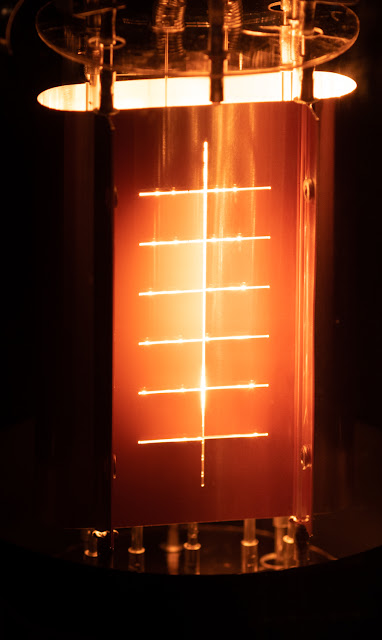Hi!
This month I would like to present a tube which is long overdue to get a spot in the Tube of the Month series. Meet the mighty 845.
The 845 is a directly heated transmitting triode designed for use as audio frequency modulator or amplifier service.
It uses a thoriated tungsten filament which operates at 10V and needs 3.25A of current. Like all thoriated tungsten filaments it lights up in a bright almost white color when in use. The 845 shares the same filament, bulb size and base with the 211. Both use a 4 pin Jumbo bayonet style base. But that is where the similarity ends. The 845 has an amplification factor of 5.3 which comes with 1700 Ohms plate resistance while the mu of the 211 is 12 at 3900 Ohms rp. In Class A1 single ended use about 25W can be obtained from a 845. But to get this the tube needs 1250V at the plate and a driver which is capable to provide a voltage swing of almost 400V peak to peak. These requirements make it quite a challenge to use the 845 as output tube. The output transformers not only need to be able to handle the power delivery but need to be isolated to withstand the high supply voltage. This voltage insulation requirement doubles since the plate of the 845 will swing to almost twice the B+ voltage when driven to full power. That is why suitable output transformers are bulky, heavy and expensive. When you look at the data sheet you will find one of the reasons (besides it's power capability) why this tube is quite popular. It has amazingly linear plate curves:And this quality holds up in real life, here the plate curves of an actual tube:
I remember the first time when I read about the 845 in the summer 1992 issue of Sound Practices. Back then this magazine occasionally had an article named 'Meet the tube' which was the role model for my Tube of the Month series.
Little had I known back then that more than 20 years later I would be a manufacturer of 845 tubes myself.
When I started to use these big transmitting tubes I was more drawn to the 211 and therefore never bought many old production 845 tubes and since I have a tube factory at hand I stopped buying old tubes altogether. So all I can show besides the ELROG variants of this tube are some United Electron 845W.
They are packed in beautiful oversized cartons.
The UE 845 has some distinct features not seen in other tubes.
A little glass stem protrudes from the tube into the tube which is used to mechanically hold the internal structure at the top.
Unlike most tubes which have the getter flashed to part of the glass bulb. In these it is contained in a small cylinder.
No getter mirror anywhere on the glass.









































































Terrific article Thomas!
ReplyDeleteGreat info and images. Do your tubes now all come in wooden boxes?
ReplyDeleteOnly ER242 and ER284 are in wooden boxes
DeleteThe Elrogs are really nice.
ReplyDeleteThis year I bought an old crate of tubes among them was a pair of RCA 845 tubes in Globe boxes. Beautiful tubes but I sold them to fund other projects.
Do you plan to build a 212 triode replica also? It would be terrific and damn very expensive. Doubtless no a great market for this model. I'm now using Huaguang Chinese replica
ReplyDeleteHi! In the moment we have more demand than production capacity for the 300B variants and rectifiers. So no plans to introduce a new type until we can catch up with demand.
DeleteI love your images of the 845 tubes and variants! What macro lens are you using for these? I usually use a APO-105mm f2.8 Printing Nikkor or Tochigi Nikkor 90mm f4 VF (1-3X)
ReplyDeleteHi! I mostly use AF-S VR Micro-Nikkor 105mm f/2.8G IF-ED or an older AF Micro-Nikkor 200mm f/4D IF-ED
Delete